|
Printables |
PowerPoints |
Online exercises |
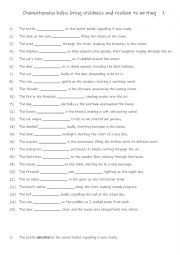
|
B1+-C1 Onomatopoeia helps bring vividness and realism to writing 1
Learning onomatopoeia (words like barked, buzzed, chimed, pitter-pattered, and whistled) is essential because it helps students vividly describe sounds, making their writing and speech more engaging and expressive. These words mimic real-life sounds, adding a sensory dimension to storytelling or descriptions (e.g., "The leaves rustled in the wind")...
Level: intermediate
Age: 13-100
Type:
Downloads: 105
|
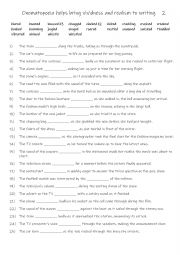
|
B1+-C1 Onomatopoeia helps bring vividness and realism to writing 2
Mastering onomatopoeic words also enhances student�s creativity and ability to connect language with the sounds of the world around them. First, students need to familiarise themselves with the 25 words and their meaning. Then they read the sentences to see which one is needed to complete the gap-fill. Answers on page 2.
Level: intermediate
Age: 13-100
Type:
Downloads: 116
|
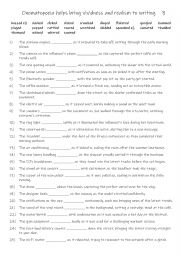
|
B1+-C1 Onomatopoeia helps bring vividness and realism to writing 3
Mastering onomatopoeic words also enhances student�s creativity and ability to connect language with the sounds of the world around them. First, students need to familiarise themselves with the 25 words and their meaning. Then they read the sentences to see which one is needed to complete the gap-fill. Answers on page 2.
Level: intermediate
Age: 13-100
Type:
Downloads: 115
|
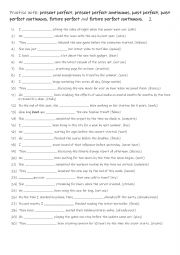
|
B1+-C1 Practise with present perfect, present perfect continuous, past perfect, past perfect continuous, future perfect and future perfect continuous. 2
First, students need to familiarise themselves with the 6 tenses and their meanings. Then they read the sentences to see which one is needed to complete the sentence using the given infinitive in (). Each tense is used 5 times! Answers on page 2
Level: intermediate
Age: 10-100
Type:
Downloads: 103
|
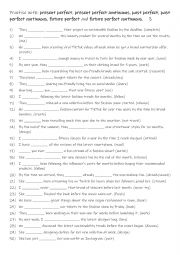
|
B1+-C1 Practise with present perfect, present perfect continuous, past perfect, past perfect continuous, future perfect and future perfect continuous. 3
First, students need to familiarise themselves with the 6 tenses and their meanings. Then they read the sentences to see which one is needed to complete the sentence using the given infinitive in (). Each tense is used 5 times! Answers on page 2
Level: intermediate
Age: 12-100
Type:
Downloads: 101
|
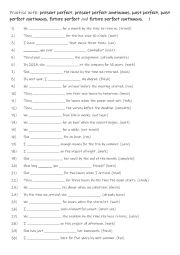
|
B1+-C1 Practise with: present perfect, present perfect continuous, past perfect, past perfect continuous, future perfect and future perfect continuous. 1
Students at the B1+ to C1 level should practise the present perfect, present perfect continuous, past perfect, past perfect continuous, future perfect, and future perfect continuous tenses to enhance their ability to express complex ideas and time relationships. These tenses help them discuss actions with relevance to the present, ongoing or comple...
Level: intermediate
Age: 10-100
Type:
Downloads: 118
|
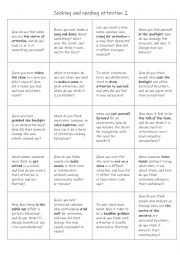
|
B1+-C1 Seeking attention idioms 2
This is a speaking reinforcement activity to supplement the other worksheet I uploaded on 15/1/2025. Students working in pairs or small groups can either ask each other the questions or answer the question themselves.
Level: intermediate
Age: 11-100
Type:
Downloads: 104
|
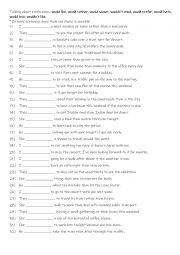
|
B1+-C1 Talking about preferences -would like, would rather, would sooner, would not mind, would prefer, would hate, would love & would not like.
Students familiarise themselves with the different ways of expressing their preferences and grammatical usage. Then they read each sentence to see which one is the most suitable to complete the gap-fill. Each form is used 4 times. Answers on page 2.
Level: intermediate
Age: 10-100
Type: worksheet
Downloads: 117
|
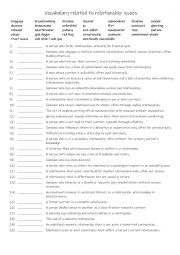
|
B1+-C1 Vocabulary related to relationship issues
Learning vocabulary related to relationship issues enhances communication and awareness of unhealthy patterns, enabling individuals to make informed decisions. Familiarity with terms like "ghosting" and "narcissist" promotes self-reflection, helping people understand their own behaviours and relationship styles. It empowers individuals to set bound...
Level: intermediate
Age: 9-100
Type:
Downloads: 108
|
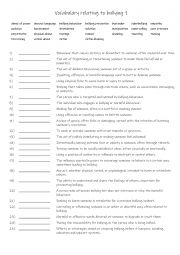
|
B1+-C1 Vocabulary relating to bullying 1
Learning vocabulary related to bullying helps students better understand, identify, and address bullying behaviours, whether in person or online. Terms like cyberbullying, harassment, and abuse of power raise awareness of the different forms bullying can take, while words like empathy and bullying prevention encourage discussions on fostering kindn...
Level: intermediate
Age: 11-100
Type:
Downloads: 108
|
|
|
|
|












